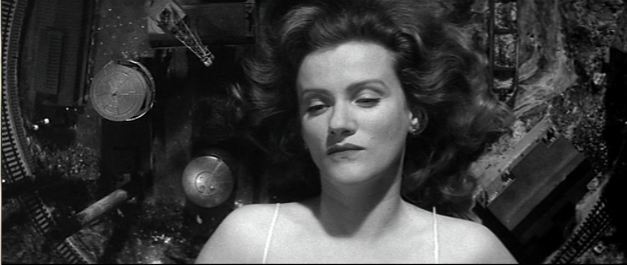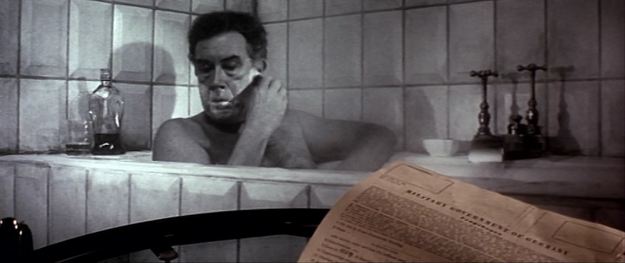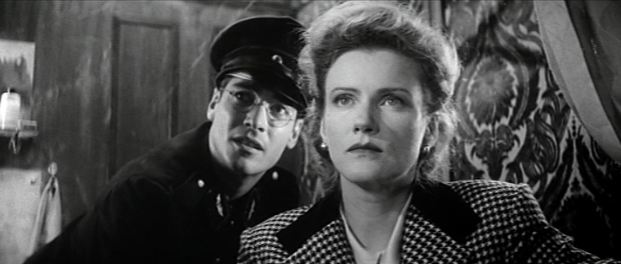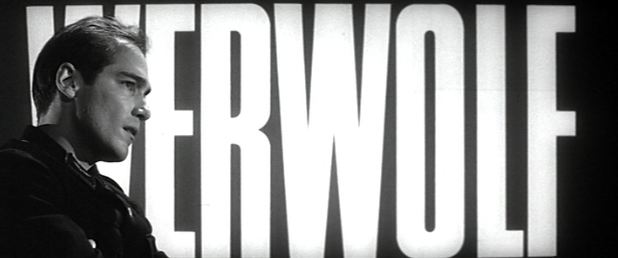‘You will now listen to my voice. My voice will help you, and guide you still deeper into Europa.’ So is the stunning opening to Europa in the world-famous voice of Max von Sydow, as he describes the journey of film, of life and of our own internal fantasy. It’s deep stuff! And one of the best openings there has ever been in film - really!
Anyway – Barbara Sukowa hasn’t aged in ten years. It’s true. And yet she plays woman here, as opposed to girl, as she does in Berlin Alexanderplatz. She is the star of this film, and what's more she is more consistent than the picture itself. I sometimes feel that Lars von Trier might have had the ability to be as prolific an independent as Fassbinder , if he weren’t so bound to studios and budgets, and to his own taste for perfection, which certainly means that something is going to take a lot longer. But he does all right.
Europa is a movie haunted by Franz Kafka, one that is steeped in Franz Kafka, and seems to scream Franz Kafka at every turn – in terms of the hapless individual in the face of uniformed officialdom, with its absurd instructions.
Caption: If I wanted to carry a weapon I would have come here earlier.
And as Europa is by Lars von Trier, there is a lot in it that doesn’t make sense, and although you may see that as a clever ploy I tend to see it as a sign that his work is either ill-conceived, or misses its incredibly high bar during execution. It is hard to comprehend, for example, how the main character can remain as naive as he does up until the climax of the film, an ending which isn’t totally credible and doesn’t quite deliver on what comes before. It's hard to accept also that there is no more to art than the making of clever jokes. It's almost as if Trier is making films for people who don't like cinema, folks that can only take cerebral pleasure from the destruction of the medium.
Nonetheless, Europa is still mildly engaging. The faces of the actors seem particularly well suited to the characters they play and Barbara Zukova, with her sphinx-like beauty, is suitably enticing, while Eddie Constantine is a fine embodiment of worldly cynicism.
One appeal of the film Europa lies in its certain European mood. There is none of the heroism or clear good/bad delineation that tend to form the bedrock of English and American films covering the World War II period, and the effect is that all of it hints at something much deeper and bigger. Europa is experimental in nature, it’s true — and so it won’t appeal to people who don’t like films that wear the technicalities of the production process on their sleeve. Those who are mad keen on the avant garde merely for the sake of itself, might however enjoy a strikingly original and beautifully realised experience.
That Europa is art, there is no doubt. But yet it has limited power because it fails on some key story elements. It’s a hideous shame that dramatic stories as we know them and love them, conform to some consistent basic habits. And although a reasonable level of conflict and tension in the set up, the story has no point, and gradually, although our interest may be held by the cinematography and inventive staging and acting, it will inevitably wane due to the poorer aspects of the story.
Interesting to note is the film’s use of black and white images mixed with colour – two years before Schindler’s List did the same, although its ironic imitation of film noir conventions becomes a chore to watch. At heart, Europa is a thriller story, something that we might remember from Fritz Lang, and lesser items of 1940s cinema – but the only way a guy like Trier can enjoy a story like that is via sarcasm. As a lover of deconstruction Lars von Trier cannot pay homage, but only break things and leave the pieces lying about. This is generally admired by people too up their own bottoms to enjoy real, emotional and fruitful cinema, but I guess it has its place.
Barbara Sukowa is great. The film is improbable, and often dull, but she is not. Philosophically speaking, there is something going on in the film tying up Hollywood, European cinema, and World War II, so it is tiresomely a film as much about film, as anything else. The regression attempt by the narrator at the opening should have been a warning about this, but as it’s such a compelling start that it’s possible that it could all be downhill from that point. Whether or not it is an entertainment experience, this is not hard to judge. Barely, is the answer.




